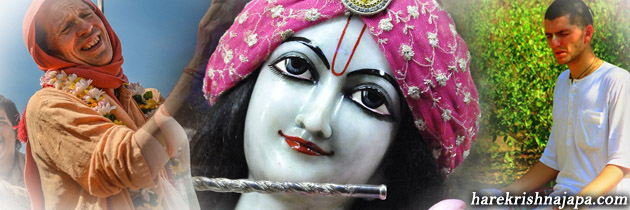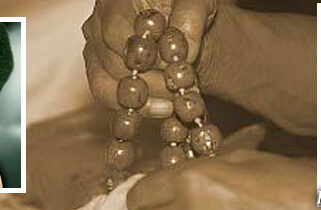22 Chanting of the holy name in the state of ecstasy

In the stage of bhava, the devotee is strongly attached to the process of chanting:
[Lord Caitanya to Sanatana Gosvami]: “Due to having a great relish for the holy name, one is inclined to chant the Hare Krsna maha−mantra constantly. ‘O Govinda, this youthful girl named Radhika is today constantly pouring forth tears like nectar falling from flowers. She is also singing Your holy name in a sweet voice.’ At this stage of bhava, a devotee has awakened the tendency to chant and describe the transcendental qualities of the Lord. He has attachment for this process… ‘O Lord Pundarikaksa, while chanting Your holy name with tears in my eyes, when shall I dance in ecstasy on the bank of the Yamuna?’ These are the symptoms of a person who has developed attraction [bhava] for Krsna.”
– Sri Caitanya caritamrta Madhya lila 23.32−34, 37−38
[The quoted statements are found in Bhakti−rasamrta−sindhu, 1.3.38 and 1.2.156 respectively.]
Strong attachment to chanting as a characteristic of ecstatic love:
Srila Rupa Gosvami next describes the characteristics of a person who has actually developed his ecstatic love for Krsna. The characteristics are as follows:
(1) He is always anxious to utilize his time in the devotional service of the Lord. He does not like to be idle. He wants service always, twenty-four hours a day, without deviation.
(2) He is always reserved and perseverant.
(3) He is always detached from all material attraction.
(4) He does not long for any material respect in return for his activities.
(5) He is always certain that Krsna will bestow His mercy upon him.
(6) He is always very eager to serve the Lord faithfully.
(7) He is very much attached to the chanting of the holy names of the Lord.
(8) He is always eager to describe the transcendental qualities of the Lord.
(9) He is very pleased to live in a place where the Lord’s pastimes are performed, e.g., Mathura, Vrndavana or Dvaraka.
– The Nectar of Devotion
Taste for chanting the holy name as a subordinate sign of ecstatic emotion:
“‘When the seed of ecstatic emotion for Krsna fructifies, the following nine symptoms manifest in one’s behavior: forgiveness, concern that time should not be wasted, detachment, absence of false prestige, hope, eagerness, a taste for chanting the holy name of the Lord, attachment to descriptions of the transcendental qualities of the Lord, and affection for those places where the Lord resides−that is, a temple or a holy place like Vrndavana. These are all called anubhava, subordinate signs of ecstatic emotion. They are visible in a person in whose heart the seed of love of God has begun to fructify.'”
– Bhakti−rasamrta−sindhu 1.3.25−26
– [cited: Sri Caitanya−caritamrta Madhya lila 23.18−19]
An advanced devotee experiences ecstasy in chanting the holy name:
[Kavi to Maharaja Nimi]: “‘When a person is actually advanced and takes pleasure in chanting the holy name of the Lord, who is very dear to him, he is agitated and loudly chants the holy name. He also laughs, cries, becomes agitated and chants just like a madman, not caring for outsiders.'”
– Srimad Bhagavatam 11.2.40
– [cited: Sri Caitanya−caritamrta Madhya lila 9.262 and Madhya lila 23.41]
While chanting the holy name, a pure devotee manifests symptoms of ecstasy:
[isvara Puri to Lord Caitanya]: “‘It is a characteristic of love of Godhead that by nature it induces transcendental symptoms in one’s body and makes one more and more greedy to achieve the shelter of the lotus feet of the Lord. When one actually develops love of Godhead, he naturally sometimes cries, sometimes laughs, sometimes chants and sometimes runs here and there just like a madman. Perspiration, trembling, standing of one’s bodily hairs, tears, faltering, fading, madness, melancholy, patience, pride, joy and humility−these are various natural symptoms of ecstatic love of Godhead, which causes a devotee to dance and float in an ocean of transcendental bliss while chanting the Hare Krsna mantra.'”
– Sri Caitanya caritamrta Adi lila 7.87−90
A pure devotee, whose consciousness is absorbed in the Supreme Lord, chants the holy name in ecstasy:
[Prahlada Maharaja to his schoolmates]: When a devotee becomes like a person haunted by a ghost, he laughs and very loudly chants about the qualities of the Lord. Sometimes he sits to perform meditation, and he offers respect to every living entity, considering him a devotee of the Lord. Constantly breathing very heavily, he becomes careless of social etiquette and loudly chants like a madman, “Hare Krsna, Hare Krsna! O my Lord, O master of the universe!”
When one chants the holy name of the Lord in ecstasy, not caring for outward social conventions, it is to be understood that he is atmamati. In other words, his consciousness is turned toward the Supreme Personality of Godhead.
– Srimad Bhagavatam 7.7.35
Ecstatic chanting as a symptom of actual love of Godhead:
[Lord Caitanya to Sanatana Gosvami]: “Now hear from Me what actual love of Godhead is. It is the prime object of life and is symptomized by bodily trembling, tears in the eyes, chanting and dancing.”
– Sri Caitanya caritamrta Madhya lila 25.139
Physical symptoms of ecstasy produced by chanting the holy name:
[Lord Caitanya said]: “My dear Lord, when will My eyes be beautified by filling with tears that constantly glide down as I chant Your holy name? When will My voice falter and all the hairs on My body stand erect in transcendental happiness as I chant Your holy name?”
– Sri Caitanya caritamrta Antya lila 20.36
Effects of the ecstatic chanting of the name of Krsna:
“I do not know how much nectar the two syllables ‘Krs−na’ have produced. When the holy name of Krsna is chanted, it appears to dance within the mouth. We then desire many, many mouths. When that name enters the holes of the ears, we desire many millions of ears. and when the holy name dances in the courtyard of the heart, it conquers the activities of the mind, and therefore all the senses become inert.”
– Vidagdha−madhava (1.15), by Rupa Gosvami
– [cited: Sri Caitanya−caritamrta Antya lila 1.99]
Narada Muni’s ecstatic symptoms due to chanting the Hare Krsna mantra:
When there was stretching of the body of Narada Muni from chanting the Hare Krsna mantra, he chanted so loudly that it was apprehended that Lord Nrsimha had appeared. Thus all the demons began to flee in different directions.
– The Nectar of Devotion
The spiritual master experiences ecstasy in chanting the holy name:
mahaprabhoh kirtana−nrtya−gita
vaditra−madyan−manaso rasena
romanca−kampasru−taranga−bhajo
vande guroh sri−caranaravindam
“Chanting the holy name, dancing in ecstasy, singing, and playing musical instruments, the spiritual master is always gladdened by the sankirtana movement of Lord Caitanya Mahaprabhu. Because he is relishing the mellows of pure devotion within his mind, sometimes his hair stands on end, he feels quivering in his body, and tears flow from his eyes like waves. I offer my respectful obeisances unto the lotus feet of such a spiritual master.”
– Sri Sri Gurv−astaka (verse 2), by Visvanatha Cakravarti thakura
Those who chant Hare Krsna in ecstasy are unconcerned with the derision of outsiders:
“We shall not care for any outsiders. If they should deride us, we shall still not care for them. We shall simply enjoy the transcendental mellow of chanting Hare Krsna, and thus we shall roll on the ground and dance ecstatically. In this way we shall enjoy transcendental bliss.”
– Padyavali, by Rupa Gosvami
– [cited: The Nectar of Devotion]
Those who chant the holy name in spontaneous ecstatic love can taste the sweetness of Krsna’s pastimes:
[Lord Caitanya to Rupa Gosvami]: “The transcendental mellows generated from the dealings between the gopis and Krsna cannot be tasted by fruitive activity, yogic austerities, speculative knowledge, regulative devotional service, mantra−yoga or meditation. This sweetness can be tasted only through the spontaneous love of liberated persons who chant the holy names with great ecstatic love.”
– Sri Caitanya caritamrta Madhya lila 21.119
Hearing and chanting in the stage of love of Godhead:
[Lord Caitanya to Sanatana Gosvami]: “When the permanent ecstasies [neutrality, servitorship, and so on] are mixed with other ingredients, devotional service in love of Godhead is transformed and becomes composed of transcendental mellows.”
In Bhakti−rasamrta−sindhu, the following definition is given:
athasyah kesava−rater laksitaya nigadyate
samagri−pariposena parama rasa−rupata
vibhavair anubhavais ca sattvikair vyabhicaribhih
svadyatvam hrdi bhaktanam anita sravanadibhih
esa krsna−ratih sthayi bhavo bhakti−raso bhavet
Love for Krsna, Kesava, as previously described, reaches the supreme state of being composed of mellows when its ingredients are fulfilled. By means of vibhava, anubhava, sattvika and vyabhicari, hearing and chanting are activated, and the devotee is able to taste love for Krsna. Then attachment for Krsna, or permanent ecstasy (sthayi−bhava), becomes the mellow of devotional service (bhakti−rasa).
– Sri Caitanya caritamrta Madhya lila 23.47





